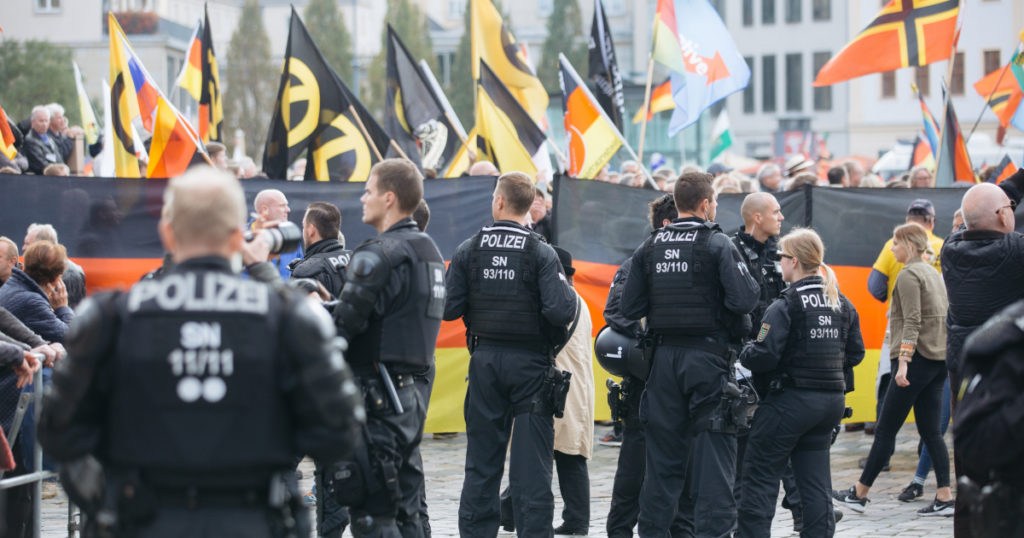BRUSSELS BEHIND THE SCENES
Weekly analysis and untold stories
With SAMUEL STOLTON
Other Brussels behind the scenes stories:
Europe's Nazi emergency
A vast plain of snow in the Polish winter, peppered by the coal-black uniforms of SS officers, whistles in between their cold lips, barking orders at the people who have come here to die.
This is how Liliana Segre recalls her introduction to Auschwitz on February 6th, 1944. Seven days previously the thirteen-year-old, along with her father, had been thrust onto a carriage departing platform 21 of Milan Central Station – the passengers were paralyzed by a ‘frightening silence’ among themselves as they made their way north, destined for the cradle of Europe’s most heinous and degenerate sin.
As soon as she had disembarked the train, her father’s hand left hers. He was hastily marched to the gas chamber. Liliana was spared. Due to her physique, she had been regarded as fit for work. She survived Auschwitz but was forever confounded by the nauseating terror that marked this fragile period of her childhood.
Recently, a similar sense of confusion for the propensity of the human spirit to hurl itself towards the most egregious of pits, re-emerged. Last week, Liliana, now an 89-year-old lifelong Italian senator, was assigned two paramilitary carabinieri officers to accompany her in public, as well as being offered police protection at her Milan home.
Sent out every Friday afternoon, BRUSSELS BEHIND THE SCENES brings the untold stories about the characters driving the policies affecting our lives. Analysis not found anywhere else, The Brussels Times' Samuel Stolton helps you make sense of what is happening in Brussels.
If you want to receive Brussels behind the scenes straight to your inbox every Friday, subscribe to the newsletter here.
This came after she began to receive a barrage of anti-Semitic threats on social media, following her support for the establishment of a parliamentary committee on combatting hate. The motion was backed despite abstentions from those on the right of the political spectrum – including Matteo Salvini’s Lega party, Forza Italia and the far-right Fratelli d'Italia. The absence of unanimous support for the plans, Segre said, made her feel like a ‘Martian’ in the Italian senate.
Elsewhere in Europe, at the beginning of November, Dresden, the capital of Saxony in Germany, declared a ‘Nazi state of emergency,’ following years of right-wing extremism in the city. Dresden is the birthplace of the anti-Islam PEGIDA movement (Patriotic Europeans against the Islamization of the West). In state elections earlier this year, the Alternative for Deutschland (AfD) party won 27.5% of the vote in Saxony.
“According to the majority of the Dresden City Council, with this declaration, the intention is to continue the dialogue on the issues we have in our region with regards to the rise of the far-right,” Christian Avenarius, Director of the Saxony Liaison Office in Brussels, told me.
Despite Dresden’s Mayor Dirk Hilbert seeking to distance himself from the phrase ‘Nazinotstand,’ literally translated as ‘Nazi emergency,’ there appears to be many such public sentiments sympathetic to the Nazi appetite for discrimination and prejudice in Dresden. The Brussels Times has obtained an internal memo circulated among Dresden city councillors that reads “xenophobic, racist and nationalistic resentments are widespread in society,” adding that “anti-democratic attitudes reach far into the middle class.” The document also notes that these problems need to be addressed in the context of the city’s bid to become the 2025 European Capital of Culture. “Too much of the city society is silent,” the memo states.
BRUSSELS BEHIND THE SCENES POWERED THIS WEEK BY
Silence, for some, is tantamount to complicity. For Michoel Rosenblum, Director of the European Synagogue in Brussels, an undercurrent of anti-Semitism pervades European society more explicitly than in the US, where he grew up. “In Europe, you are constantly reminded of your Jewishness,” he told me. “Biases against your cultural identity precede you. We need more ordinary citizens to recognise our struggle.” Every Saturday morning on the Shabbat, armed military personnel patrol the street where the European Synagogue is located. They are funded by the Belgian state as a means to protect the Jewish community at an increasingly perilous time.
“I had never heard of Judaism until, one evening in late summer, my family told me that I could no longer go to school,” Liliana Segre writes in Sopravvissuta ad Auschwitz, referring to Benito Mussolini’s 1938 racial laws. Today, while the Milan public prosecutor’s office works alongside Italy’s anti-terror police to investigate the vitriol she has been subjected to, it is unsurprising that many in the Jewish community feel increasingly targeted.
While the anti-Semitic agenda of the governing Nazi regime has thankfully been consigned to the cesspools of yesteryear, the remnants of this revolting ideology have been lying dormant in pockets of society across our continent, priming themselves to be stirred, on an occasion of which hate deems it fitting to rear its festering and putrescent head.
In 1945, for the 14-year old Liliana Segre, her world certainly hadn’t been wholly liberated following her return to Italy after the war. “I felt the disarray of a world that collapsed piece by piece, minute by minute, tired of a tiredness that was the sum of all the tiredness,” she writes. “I dragged myself on without knowing where to go, what to do with myself, who to ask for directions.”
For the disenfranchised and the subjugated across Europe, these introspections persist and more concerningly, are on the cusp of a broader re-emergence amid a climate of intolerance against minorities. These mediations on the legitimacy of one’s own culture and how such historical trajectories dictate the course of one’s life, are questions that the truly free and liberated in society should never, ever have to contend with.
Sent out every Friday afternoon, BRUSSELS BEHIND THE SCENES brings the untold stories about the characters driving the policies affecting our lives. Analysis not found anywhere else, The Brussels Times' Samuel Stolton helps you make sense of what is happening in Brussels.
If you want to receive Brussels behind the scenes straight to your inbox every Friday, subscribe to the newsletter here.


